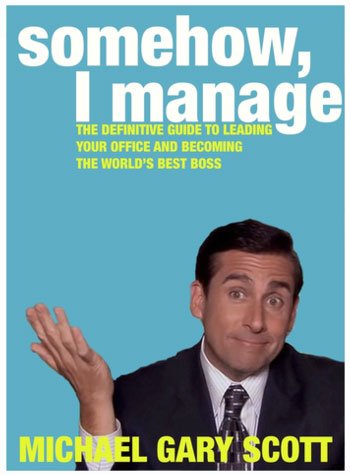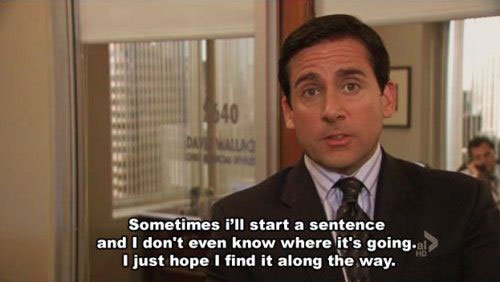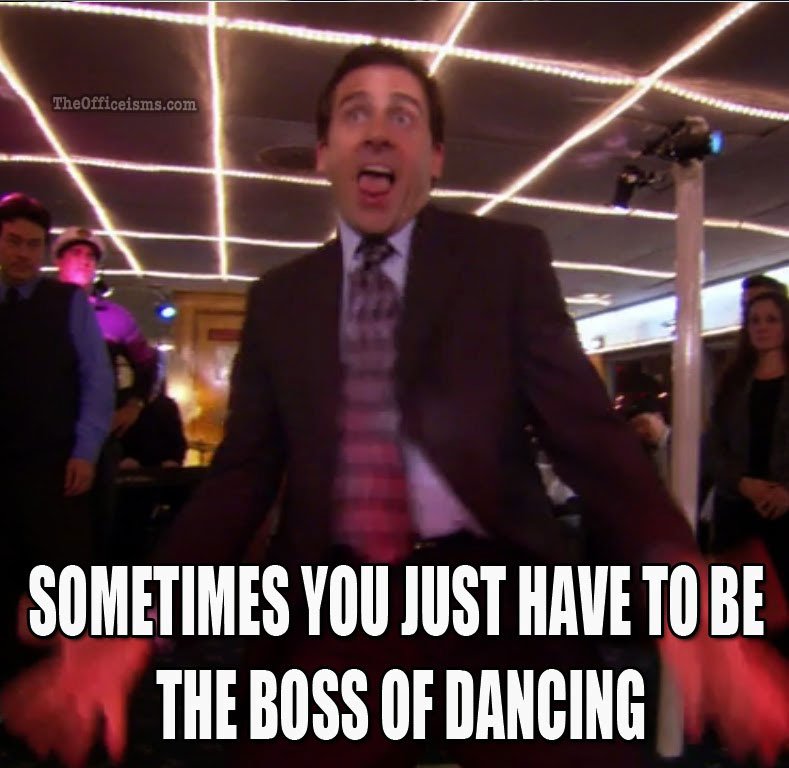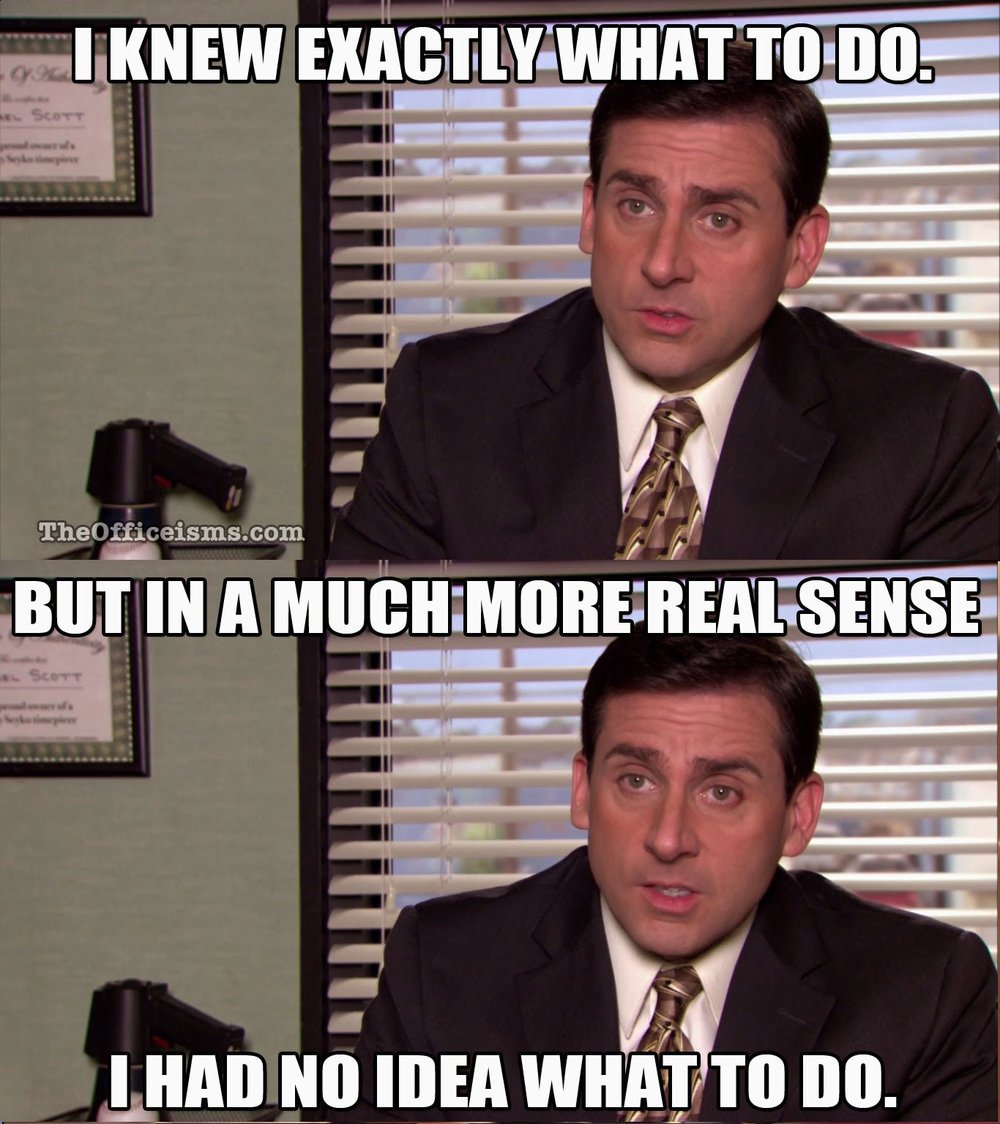Somehow I Manage: Business Lessons You Can Learn From Michael Scott
Originally Published: 10/3/2018 | Updated: 11/29/2023
From the “generous” empty promises of Scott’s Tots to the world’s most uncomfortable dinner party, you probably know by now that Michael Scott wasn’t the best at making decisions, using a computer, or evening holding appropriate conversations. But, amid his inappropriate jokes and distractions, he had a lot of good business lessons to share. So much so that he wrote a book, "Somehow I Manage." While you can’t actually buy the book, we think there are some valuable lessons to learn from Michael.
Throughout his tenure at Dunder Mifflin and the Michael Scott Paper Company, he fostered genuine relationships with employees and customers, inspired people to dream big, and demonstrated that failure is simply a pitstop on the way to success. Of course, other times, Michael was the epitome of what not to do.
Whether you’re in the process of starting your own business or you’re a seasoned professional, you might find some gems in this piece. So, pour yourself a cup of coffee (check with future Jim to ensure it’s not poisonous), and consider jotting down some mental notes on a hearty piece of Dunder Mifflin paper.
Talk Out Your Problems
Though unconventional, Mike had a multitude of great methods for tapping into his creative problem-solving side. One of his favorite strategies was simply talking through problems.
“Sometimes I’ll start a sentence, and I don’t even know where it’s going. I just hope I find it along the way.”
When problems seem overwhelming, and the solution is unclear, getting started is often the hardest part. Take a page out of Michael Scott’s book and take action by talking through the situation. Either dictate your thoughts into your phone or start brainstorming with your team.
Not only can hearing your problem out loud spark a creative solution, but it can also be a boon to your team's motivation. A study on Inc.com suggests that saying goals aloud to yourself or to a friend increases the chances of achieving those goals by up to 85%.
Talking through a problem with a coworker or friend can also provide a fresh perspective on the issue and highlight details you may not have otherwise noticed. On the other hand, Michael was also a master productivity killer, and his chatter was his weapon of choice.
Associative thinking and brainstorming in small groups can lead to improved creative problem-solving and innovative solutions. Just know, research also shows that both productivity loss and the number of irrelevant ideas were more prevalent in small-group brainstorming sessions than in solo ones.
Citing this research is not to suggest that you shouldn’t problem solve as a team. What is important is that you have a point to your meetings, create an agenda to stay on track, and limit the amount of time you spend kicking around ideas.
2. Form Real, In-Person Connections
“Nice to meet me.”
Above all, Michael treasured his relationships with coworkers and clients more than any other part of his job at Dunder Mifflin. Although his desire to be liked was often overbearing, he would have done anything to preserve his friendships.
“Make friends first, make sales second, make love third. In no particular order.”
Michael’s affections toward some coworkers (Ryan) might have been overkill, but his mission to make everyone feel valued is admirable. When it comes to running a successful business, an employer’s positive treatment of employees is so essential that even customers take it to heart. Based on research conducted through Cone Communications, above all other factors, 94% of consumers want to purchase from businesses that treat their employees well.
By prioritizing and fostering genuine connections with his clients, Michael became his branch's top salesman, earning him the Regional Manager promotion. And, even though technology is an essential component of modern business, Mike emphasized the importance of strong social connections over being computer savvy.
“People will never be replaced by machines. In the end, life and business are about human connections. And computers are about trying to murder you in a lake. And to me, the choice is easy.”
Little did Mr. Scott know just how prophetic he was. Today, it’s hard to listen to a podcast, watch a movie, or read a book without someone discussing the dangers of AI. Although “Computers are about trying to murder you” is a bit heavy-handed, Mike’s not entirely wrong. Just this past September 2023, the Atlantic published an article title “Robots Are Already Killing People.”
Joking aside, building relationships with clients and coworkers is essential. A 2016 Deloitte Millennial Survey found that prioritizing the treatment of customers and the treatment of employees were two of the top values directly related to a business’s success. Fair treatment of clients and staff also:
Boosts morale
Differentiates your business from others
Helps generate leads by referral
Improves customer satisfaction
Reduces the chance of negative reviews
Retains customers
At a time when there is an actual “loneliness epidemic” that the U.S. Department of Health and Human Services has warned about extensively in 2023, it’s clear human connection is essential. They found that the lack of social connection poses a significant risk to individual health and longevity. More specifically:
Loneliness and social isolation increase the risk of premature death by 26% and 29%, respectively.
Lacking social connection can increase the risk of premature death as much as smoking up to 15 cigarettes a day.
Poor or insufficient social connection is associated with an increased risk of disease, including a 29% increased risk of heart disease and a 32% increased risk of stroke.
Loneliness is associated with an increased risk of anxiety, depression, and dementia.
Lacking social connection may increase susceptibility to viruses and respiratory illness.
All this is to say, Mike’s on point with his gut feeling about human connection. It’s critical to business and life.
3. Lean into Laughter
“That’s what she said.”
If we learned anything at all from Michael, it’s to never take yourself too seriously. Michael Scott was a fun-loving, inappropriate joke-telling whirlwind of chaos, but he often used his blunders to reveal deeper truths:
“The reason that you are all so stressed around me is that you are too intimidated to tell me what you really think. You are keeping these feelings inside, and that is causing stress. So what is a solution? The solution is honesty, laughter, and comedy.”
Michael identified stress within his employees, and despite being the primary cause, he provided proven relief techniques to ease the tension. Research by the Mayo Clinic suggests that laughter is, in fact, one of the best medicines. Research shows that humor may:
Improve health
Reduce pain
Relieve stress
Strengthen the immune system
Although having a roast at his own expense may not have gone as he planned, Michael still found solace in being able to laugh at himself and others in the end. In fact, his roast even exposed deeper truths; for example, it revealed that getting employee feedback and receiving constructive criticism not only makes employees feel valued but also improves management practices all around.
However, we would be remiss not to mention the importance of boundaries in workplace humor. Michael Scott crossed many lines, and his particular brand of jokes was rarely appropriate.
Use your best judgment as to what is appropriate for your office. If you’re concerned a joke might offend someone, it’s better to err on the side of caution. Undoubtedly, some people may find offensive jokes humorous, but for many, they’re simply disrespectful. If you’re still unsure of what’s appropriate, use Michael Scott as your barometer; basically, if it’s a joke he would tell, don’t tell it. And if you still want to tell it, just know that not everyone will find it funny.
4. Make Sure You’re Moving
On the other side of the fun-loving coin, Mike was an advocate of the occasional two-step:
“Sometimes you have to take a break from being the kind of boss that’s always trying to teach people things. Sometimes you just have to be the boss of dancing.”
Learning to relax through exercise, especially dance, is a scientifically proven method of stress relief. According to research published by Harvard University, dancing produces serotonin in the brain, which improves mood and decision-making skills. While you don’t need to open up a disco café in your building’s spare utility closet or own the dance floor on a booze cruise, you can take intentional steps to reduce stress in your staff by encouraging exercise during the day.
5. Take Risks
“I am Beyoncé always.”
Michael believed in himself wholeheartedly. He consistently spoke of the importance of confidence and displayed it when he began his own paper company. It’s true that it’s important to make calculated decisions to minimize risk, but Michael had a point when he wrote: ““You miss 100% of the shots you don’t take. -Wayne Gretzky” - Michael Scott”
You’re never going to grow your business or sharpen your skills if you don’t take risks. Research suggests that creativity and innovation are a direct function of how often you pursue new ideas.
Statistically speaking, the more you try, the more often you will fail—but you are also more likely to come up with the best course of action. Every failure teaches a lesson and improves your chances of success for the next attempt.
In case you didn’t notice, Michael Scott doesn’t take no for an answer. He climbed his way to Regional Manager of Dunder Mifflin’s Scranton branch and left as the leader of the number one branch in the company. He sets the bar high and holds himself to that standard.
“The only time I set the bar low is for limbo.”
Raising your standards and setting clear, definitive goals will improve your processes and generate new business. Adapted from Psychology Today, a few ways to reach goals include:
Asking for support and feedback
Committing to the idea
Making them challenging but attainable
Making them measurable and specific
Writing them down
Actionable objectives make it easier to visualize a benchmark and achieve progress efficiently.
6. Know What You Know
“I understand nothing.”
Admittedly, Mr. Scott could have been better at acknowledging his shortcomings. But his quirky flashes of introspection helped underscore where his weaknesses were.
“I knew exactly what to do. But in a much more real sense, I had no idea what to do.”
By being your own devil’s advocate, asking for your team’s expertise, and doing your research, you’ll be in a much better position to create comprehensive solutions. As an owner, executive, or manager, take stock of what you know and what you need help with. Few people are worse than a boss who thinks they know an employee’s job and then botches it.
7. Know The Benefits and Downfalls of Technology
“I’m sort of an expert at Photoshop.”
Michael maintained a roller-coaster relationship with technology throughout the series. The following groundbreaking observations are healthy, relatable reminders about our daily lives.
“When I discovered YouTube, I didn’t work for five days.”
Consumers are spending more time on their devices than ever before. According to research by MIT Technology Review, U.S. adults spend an average of 24 hours per week on the Internet. Follow Michael’s example (don’t spend five days on YouTube) and get your business’s online presence optimized for Internet traffic.
Mid-series, Mike realized the importance of updating technology and streamlining new processes. He emphasized the direct effects of modernization through timeliness and efficiency:
“Fax? Why don’t you just send it over on a dinosaur?”
Especially with the millennial generation, modern equipment is a monumental factor in choosing an employer. In fact, according to a Microsoft survey, 93% of millennials say that having updated technology at their job is important to them. If your business is working with antiquated tech, consider updating for the sake of retaining nearly all of this generation’s workforce.
Bears. Beets. Do Better Business
There is a lot you can learn from Mr. Scott. Sometimes, it is more about what you shouldn't do than what you should do. From the new ways consumers find and interact with businesses to new content management and client relation systems, there are often too many moving parts for a small team of solo entrepreneurs to handle themselves.
At Ethos Copywriting, we'll work with you to develop a marketing strategy that suits and enhances your brand. Whether you're looking for a content manager to help you personify your business or need a consultant to guide you, reach out to Ethos Copywriting today.
Catch you on the flippity flip.
Quotes from:
Daniels, G. (Writer). (n.d.). The Office [Television series]. Panorama City, California: NBC.
Feature Image:
Daniels, G. (Writer). (n.d.). The Office [Television series]. Panorama City, California: NBC & Netflix Season Five - Episode Nine.







